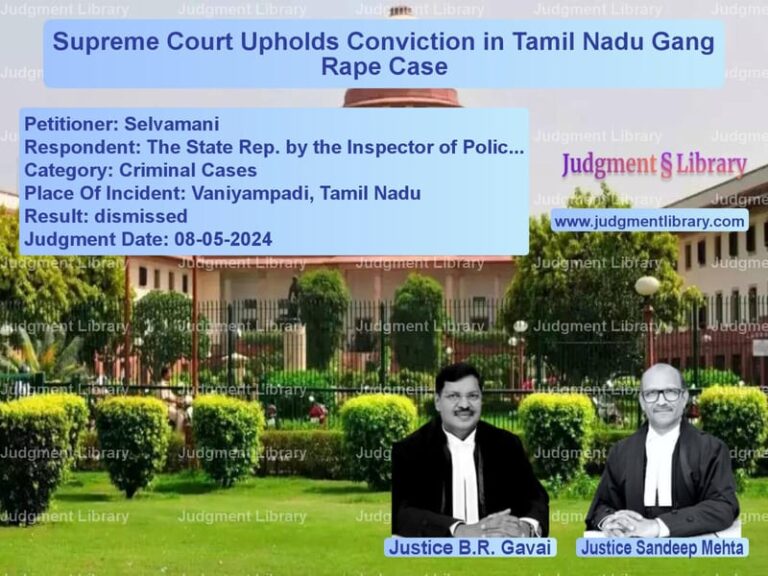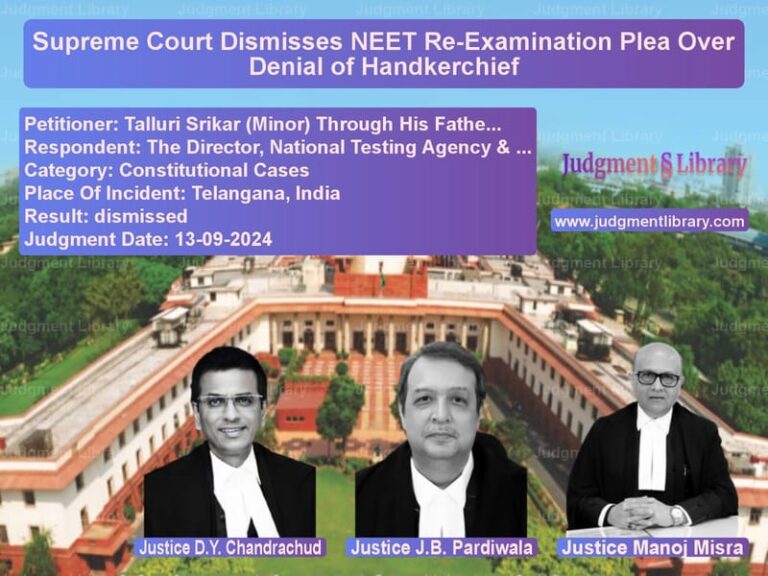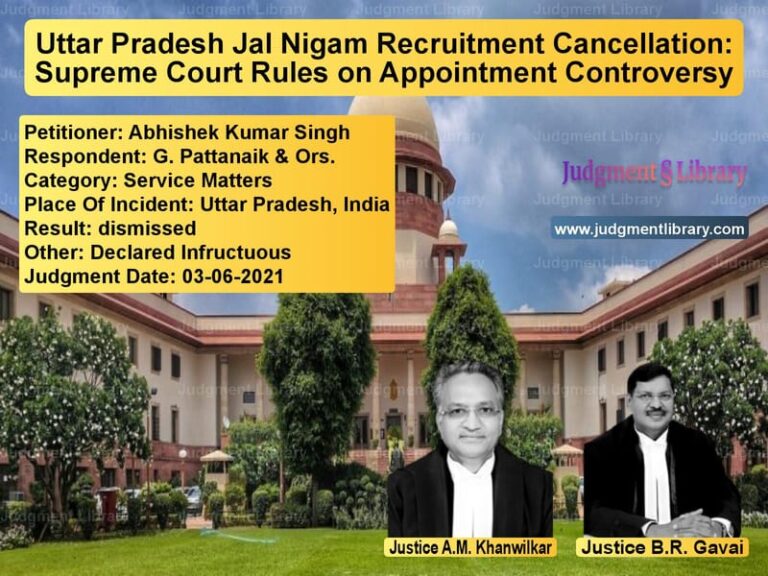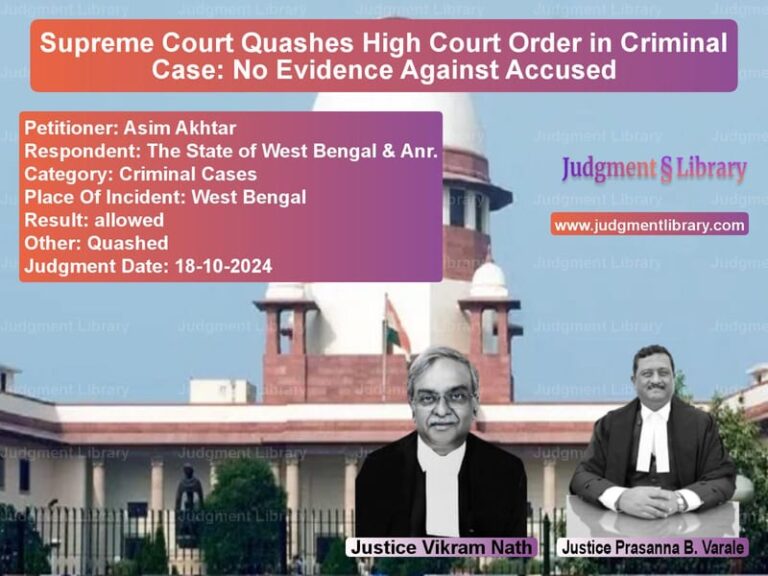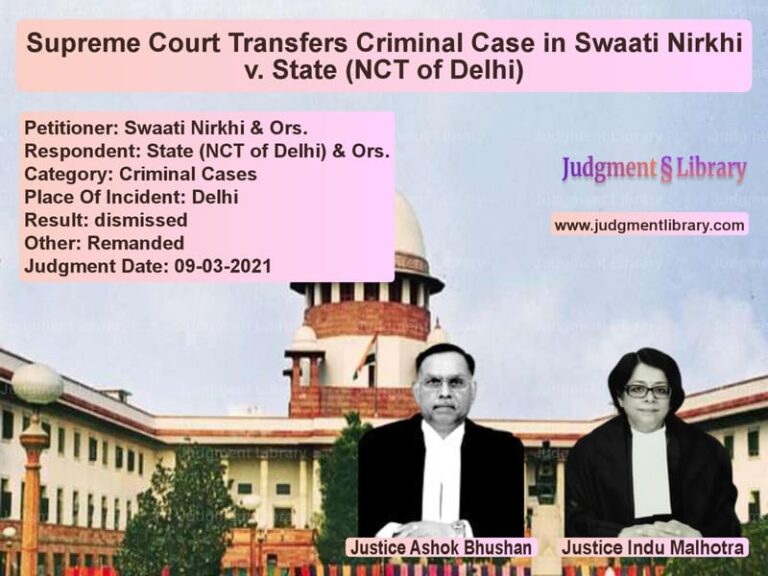Applicability of EPF Act on Private Security Agencies: Supreme Court’s Ruling
The case of M/S Panther Security Service Private Limited vs. Employees’ Provident Fund Organisation revolved around whether a private security agency providing security personnel to various establishments was liable to comply with the provisions of the Employees’ Provident Funds and Miscellaneous Provisions Act, 1952 (EPF Act). The Supreme Court upheld the applicability of the EPF Act to such agencies, setting an important precedent for businesses engaged in outsourcing personnel.
The appeal arose from a decision of the Assistant Provident Fund Commissioner, Kanpur, which was affirmed by the High Court. The appellant contested that it was not covered under the EPF Act since it only facilitated security personnel for its clients and did not act as their employer.
Background of the Case
- The appellant, Panther Security Service Private Limited, was engaged in providing private security guards to various clients.
- The EPF authorities conducted a raid and found that the appellant had more than 20 employees and was liable under the EPF Act.
- Despite multiple notices, the appellant did not provide wage and salary registers.
- The Assistant Provident Fund Commissioner ruled that the appellant was covered under G.S.R. No. 805, dated 17.05.1971, making it liable for provident fund contributions.
- The High Court upheld the ruling, leading the appellant to approach the Supreme Court.
Petitioner’s Argument
The appellant’s counsel contended:
- The appellant was not an employer but only a facilitator between the security guards and its clients.
- It did not engage in providing “expert services” under the 1971 notification.
- The wages were paid directly by clients to security personnel.
- The company had only five employees on its official rolls, which was below the threshold for EPF applicability.
- Since it was registered under the Private Security Agencies (Regulation) Act, 2005, it was not governed by the EPF Act.
Respondent’s Argument
The Employees’ Provident Fund Organisation countered:
- The appellant was actively engaged in providing trained security personnel to establishments and charged a service fee for the same.
- The wage records obtained during the investigation showed that the appellant had 79 security personnel on its rolls.
- The payments for security personnel were routed through the appellant, making it the employer.
- The company failed to provide statutory records, which indicated an attempt to evade compliance.
- Multiple legal precedents supported the applicability of the EPF Act to security agencies.
Supreme Court’s Analysis
The Supreme Court examined two key aspects:
1. Applicability of the EPF Act to Private Security Agencies
The Court observed that G.S.R. No. 805, dated 17.05.1971, explicitly brought establishments rendering expert services, including the supply of personnel, under the purview of the EPF Act. The notification stated:
“The said Act shall apply to every establishment rendering expert services such as supplying of personnel, advice on domestic or departmental inquiries, special services in rectifying pilferage, thefts, and payroll irregularities.”
The Court ruled that:
- Security agencies provide expert services by supplying trained personnel.
- Merely acting as an intermediary does not exempt them from being categorized as an employer.
- Employees deployed at different locations remain under the control of the agency.
- Since the agency was making payments to the guards from amounts received from clients, it was the principal employer.
2. Employer-Employee Relationship
The Court referred to multiple legal precedents, including:
- Group 4 Securitas Guarding Ltd. vs. Employees Provident Fund Appellate Tribunal – Private security agencies fall under the EPF Act if they meet employment thresholds.
- G4S Secure Solutions India Pvt. Ltd. vs. The Regional Provident Fund Commissioner – Payments made through agencies indicate an employer-employee relationship.
- Orissa State Beverages Corporation Ltd. vs. Regional Provident Fund Commissioner – Establishments with more than 20 employees are liable under the EPF Act.
The Court held:
- The security guards were not independent contractors but employees of the agency.
- The agency was responsible for salary disbursement and employment benefits.
- The appellant failed to furnish relevant records, reinforcing the inference of liability.
- Since the agency was responsible for deploying, training, and paying guards, it was an employer under the EPF Act.
Key Observations by the Supreme Court
The Court, in its ruling delivered by Justices Navin Sinha and Surya Kant, observed:
“We have no doubt in our mind that the appellant is engaged in the specialized and expert services of providing trained and efficient security guards to its clients on a payment basis. The contention that the appellant merely facilitated in providing Chowkidars cannot be countenanced.”
Additionally, the Court ruled:
- The EPF Act applies to establishments with 20 or more employees.
- Security agencies provide a specialized service, making them liable for EPF contributions.
- The company’s failure to maintain wage registers indicated a deliberate attempt to evade liability.
- The appellant should have approached the EPF Tribunal instead of filing a writ petition.
Final Judgment
The Supreme Court ruled:
- The appeal lacked merit and was dismissed.
- The stay on enforcement of Rs. 42,01,941 in EPF dues and Rs. 30,44,224 in interest was lifted.
- The agency was directed to comply with EPF regulations immediately.
Implications of the Judgment
This ruling has significant implications:
- Private security agencies must comply with the EPF Act if they employ more than 20 personnel.
- Firms cannot escape liability by structuring payments through clients.
- Employment records must be properly maintained to avoid legal scrutiny.
- Entities engaged in outsourcing personnel should ensure EPF compliance.
The judgment reinforces the principle that organizations hiring and deploying workers remain accountable as employers under labor laws. It prevents misclassification of employees and ensures social security benefits for workers in outsourced roles.
Petitioner Name: M/S Panther Security Service Private Limited.Respondent Name: Employees’ Provident Fund Organisation.Judgment By: Justice Navin Sinha, Justice Surya Kant.Place Of Incident: Kanpur.Judgment Date: 02-12-2020.
Don’t miss out on the full details! Download the complete judgment in PDF format below and gain valuable insights instantly!
Download Judgment: MS Panther Security vs Employees’ Provident Supreme Court of India Judgment Dated 02-12-2020.pdf
Direct Downlaod Judgment: Direct downlaod this Judgment
See all petitions in Employment Disputes
See all petitions in Public Sector Employees
See all petitions in Recruitment Policies
See all petitions in Judgment by Navin Sinha
See all petitions in Judgment by Surya Kant
See all petitions in dismissed
See all petitions in supreme court of India judgments December 2020
See all petitions in 2020 judgments
See all posts in Service Matters Category
See all allowed petitions in Service Matters Category
See all Dismissed petitions in Service Matters Category
See all partially allowed petitions in Service Matters Category


